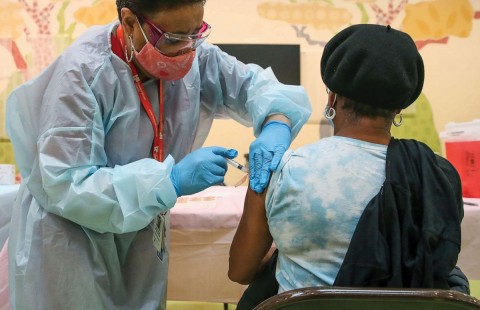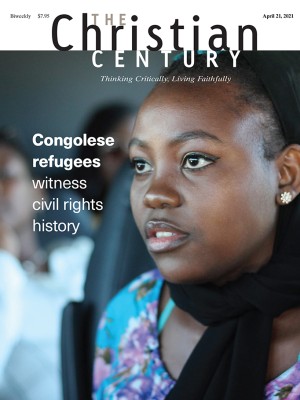
For many, the isolation, grief, and anxiety of the COVID-19 pandemic seem to be nearing an end. Three vaccines have been tested and approved and are now being widely distributed. Vaccine hesitancy, however, remains an issue—and in the African American community in particular. In a November survey by the Pew Research Center, only 42 percent of Black respondents said they were likely to get vaccinated, compared to 60 percent of respondents overall.
Heeding the call to care for their flock, Black churches have been working hard to address the concerns of community members. In February, another Pew survey found that the number of overall respondents who plan to get vaccinated (or already have) went from 60 to 69 percent—and that the number of Black respondents went from 42 percent all the way to 61 percent.
Read our latest issue or browse back issues.
Chicagoan Curtis Jackson was one such person leery of the vaccine. Jackson said he had adopted a wait-and-see attitude about it.
“I fully intended to get it, but I thought I should wait a little longer until it had been tested for side effects,” he said. “However, when I heard that my church home, Trinity United Church of Christ, was involved in the vaccine distribution, I trusted that my church family wouldn’t steer me wrong, so I registered.”
Jackson’s response is exactly what the church on the South Side of Chicago was going for. Many among Trinity’s congregation and surrounding community have had serious reservations about the vaccinations, although they are part of a population deeply impacted by COVID deaths. (Disclosure: This writer is a member of the church’s communications staff.)
On a snowy day in February, Trinity opened its doors to more than 400 people, who waited in a line that snaked around the church building exterior. The church worked in partnership with Howard Brown Health, a local health center with a mission to end health-care disparities for LGBTQ people. When a Trinity member approached the organization with concerns about how and where the vaccines were being administered in Chicago, Howard Brown was eager to work with the church on racial disparities as well.
“COVID-19 has devastated our community,” said Trinity pastor Otis Moss III. “This vaccine, developed by a Black woman, is our best defense against the disease and our brightest pathway to return to normal—if we take the vaccine. It is irresponsible to risk your own health and the health of others when there is a vaccine with a 95 percent rate of protection.”
Moss was referring to the work of National Institutes of Health scientist Kizzmekia Corbett, who led the team that developed the Moderna vaccine.
The apprehensions some Black Americans have had are not unfounded. People remember the Tuskegee Study, in which Black men were recruited to participate in a syphilis study but were intentionally not given the recommended drug treatment when it became available. Growing awareness of the Henrietta Lacks case may also be a factor. After Lacks was treated for cervical cancer in 1951 at the Johns Hopkins Hospital, her cells were used for research—without consent from her or her family. And various studies have highlighted ongoing racial disparities in medical treatment. All of these factors can stoke suspicion around a vaccine developed rapidly under emergency conditions amid a pandemic that has disproportionately killed Black people.
Understanding the community’s concerns, Moss and the Trinity staff communicated with people regularly about the pandemic and the vaccines—using social media, a virtual town hall meeting, ads from doctors in the congregation, newsletters, and recorded phone calls. This type of communication is critical, according to Channyn Parker, director of strategic partnerships at Howard Brown. “The technologies we have used to reach folks don’t work for those who are marginalized,” she said. “To expect everyone to use the same methods of communication speaks volumes as to the inequities of people receiving vaccine information. So much of the effort on distributing information about the vaccine has missed people who really needed it the most.”
According to Parker, Howard Brown has also had to combat what she called “looting vaccines” intended for a given community. She pointed out “the arrogance of some communities,” in which people “feel entitled to not have to wait and are willing to drive into communities they would never consider visiting” in order to get vaccinated.
Trinity’s efforts have helped with some of the various hurdles involved in getting the vaccines to the African American community. “When I saw how badly the virus was mismanaged in the US and how science was being ignored, I wasn’t sure if I could trust this vaccine,” confessed longtime church member Denise Powell. “My doctor shared research that showed the science behind this vaccine has been developed over 20 years, which is the normal time it takes to develop vaccines. Hearing this made me more comfortable.” Powell said she decided to get the vaccination when she heard that Trinity was offering it—but when she showed up at the church, all doses had already been given out.
That same day, she was able to go to New Beginnings Church, about five miles from Trinity, to get vaccinated.
Churches around the country have been engaging in similar work to educate the Black community about the virus and encourage people to get vaccinated. Charley Hames Jr., pastor of Beebe Memorial Cathedral in Oakland, California, recently hosted a YouTube conversation called “COVID-19 Vaccine: ‘Take It or Not?’” Hames’s guest was Horace Smith, pastor of Apostolic Faith Church in Chicago, former presiding bishop of the Pentecostal Assemblies of the World, and a practicing pediatrician at Chicago’s Lurie Children’s Hospital. During the discussion, Smith said that it was a “no-brainer” for him to receive the vaccine because of its ability to prevent serious illness from the virus. His candor as both a pastor and a medical doctor was designed to reach people on the fence.
Michelle Gaskill-Hames joined the conversation as well. The Beebe Memorial first lady is a Kaiser Permanente executive, managing hospital operations across Northern California. She talked about her experience of the pandemic as a health administrator, about the need to address COVID-19 disparities, and about why vaccination is so important. She addressed questions about the new virus strains that are circulating, along with other questions and misconceptions people have that might prevent them from being vaccinated.
Cory Jones and Clabon Bogan, both Baptist pastors in underserved parts of Burlington, New Jersey, have worked together to preregister members of their congregations and communities to get vaccinated over a weekend in March. This included developing a system to ensure that those who lack internet access or savvy could register by phone. More than 800 people signed up, and an additional weekend was planned. Their goal is to distribute more than 3,000 vaccines provided by the Virtua hospital system and the Burlington County Health Department.
Jones, pastor of Tabernacle Baptist Church, said that there is a false idea that the vaccine is not wanted in the Black community. The reality, he said, is that there has been no outreach to the Black community—and there is a lack of trust there.
Church efforts to educate a skeptical community have borne fruit. “I am a skeptic when it comes to using something that seemed rushed to market,” admitted Trinity UCC member Beverly Byrd, an MRI technician. “A few factors steered my decision to get vaccinated. My immediate family and I had COVID in March and April of 2020. It was extremely scary to see loved ones so sick that all you could do was pray. Antibodies diminish with time, so you can get COVID again. I never want to feel so helpless again.” Byrd said she prayed about receiving the vaccine. “When it was announced that Trinity United Church of Christ was going to provide vaccinations, I took that as a sign from God. I felt that if I fit the criteria for qualification, I would get it—and I did.”
A version of this article appears in the print edition under the title “Vaccinated at church.”





